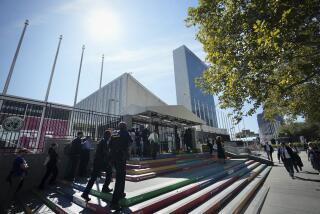Annan Nominated for 2nd Term as Secretary-General
- Share via
UNITED NATIONS — The Security Council unanimously nominated Kofi Annan on Wednesday for a second five-year term as secretary-general, paving the way for the 189-member General Assembly to formally endorse his election Friday.
Annan’s impending reelection breaks tradition in several ways. The vote usually occurs at the end of the year. And, under the U.N.’s rotation schedule, an Asian diplomat would have been expected to get the post.
But because Annan had no opposition, the current council president, Bangladeshi Ambassador Anwarul Chowdhury, proposed moving up the process. The move is seen as both a gesture of support on the last day of the global AIDS conference that Annan conceived and a chance to allow a developing country to preside over his selection.
“We regard his first term as a marvelous epitome of what a secretary-general should do with this organization and how he should lead it,” British Ambassador Jeremy Greenstock told reporters after the council vote.
Compared with the battle over the term of the previous secretary-general, Egyptian Boutros Boutros-Ghali, Annan has had a smooth road to a second term. The U.S. led a campaign in 1996 to block Boutros-Ghali from continuing as the world’s top diplomat, arguing that he was too bureaucratic, undiplomatic and anti-American.
In contrast, Annan, a U.S.- and British-educated descendant of Ghanaian royalty, has wide support from wealthy and poor countries alike.
Former U.S. Ambassador to the U.N. Richard Holbrooke called him “the international rock star of diplomacy.” In Ghana, where crowds throng the street when he visits, the people call him “Father.” At U.N. headquarters, he is known simply as “Kofi” or “the S.G.”
Annan has his own interpretation of his moniker.
“My own title ‘S.G.’--I often say that it stands for ‘scapegoat,’ because when things go wrong and things are terribly complicated and the governments don’t know what to do with it, they dump it on the United Nations,” he told an Oxford University audience last week. “But I think we do sometimes get a bum rap. We are doing much, much more than we are given credit for.”
Annan, soft-spoken but direct, often brushes aside much of the credit he is accorded, but he is also willing to shoulder his share of the blame. Two of the most significant failures of the peacekeeping system--that of U.N. soldiers to prevent the genocide in Rwanda in 1994 and the massacre of more than 7,000 Muslims by Serbs in a U.N. “safe haven” in the Bosnian city of Srebrenica in 1995--occurred under his watch as head of peacekeeping operations.
Haunted by those tragedies, Annan commissioned candid and damning reports on how the calamities occurred and how to ensure they would not happen again. He also ordered a thorough review of the peacekeeping operations last year, a process that is still grinding along.
Annan has reinvigorated the U.N.’s role as a neutral broker in the Mideast crisis. For years, the world body has been dominated by pro-Palestinian voices, but the secretary-general has shepherded Israel’s participation in the U.N. He earned both sides’ trust and even helped mediate at a summit in Sharm el Sheik, Egypt, last fall.
Most significantly, in what has become known here as the “Annan Doctrine,” he has repeatedly declared that state sovereignty must not shield nations in the face of crimes against humanity. The world, he says, has an obligation to intervene.
“Of all the secretaries-general to date, Annan has best understood the centrality of human rights to the work of the United Nations,” said Joanna Weschler, Human Rights Watch’s representative to the U.N. “His reappointment is a real victory for human rights.”
Even so, his tenure comes at a time when the U.N. is being asked to play an increasingly greater role with fewer resources than ever. Too often, the U.N. offers just enough to raise expectations but not enough to fulfill them, critics say.
The world body is behind in payments to nations that contribute peacekeeping troops and host refugees. The slow-moving bureaucracy has drawn the contempt of the U.S. Congress, though it still uses the U.N. alternately as a scapegoat or a surrogate when it comes to touchy matters of foreign policy. After a grudging recognition of the world body’s role in global affairs, Washington finally agreed this year to pay most of the $1.2 billion it owes in back dues that had been withheld in an attempt to speed reform.
More to Read
Sign up for Essential California
The most important California stories and recommendations in your inbox every morning.
You may occasionally receive promotional content from the Los Angeles Times.













